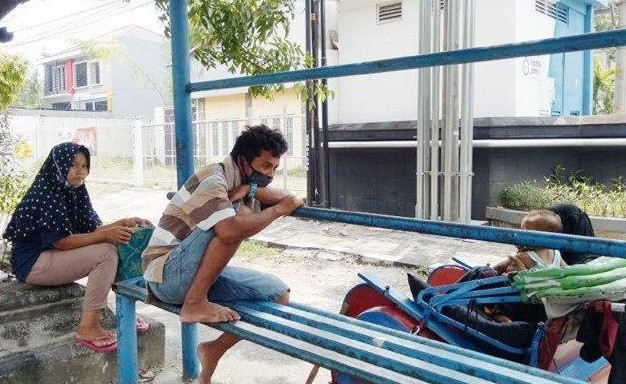Popular Reads
Top Results
Can't find what you're looking for?
View all search resultsPopular Reads
Top Results
Can't find what you're looking for?
View all search resultsSurakarta family lives in pedicab after breadwinner loses job in COVID-19 layoffs
Change text size
Gift Premium Articles
to Anyone
A
family of three in the city of Surakarta in Central Java lived and slept on a becak (pedicab) for a month after the breadwinner, 30-year-old Dul Rohmat, lost his job as a construction worker as a result of the COVID-19 outbreak.
With no income, the family could not afford to rent a room.
Dul, his 33-year-old wife Fatimah and their 13-month-old baby lived by moving from one place to another. They stayed mostly on Jl. Adi Sucipto in Laweyan subdistrict, where there were fewer mosquitos, Fatimah said.
The couple moved from Grobogan regency to Surakarta for the better job prospects. In Surakarta, they used to pay Rp 400,000 (US$ 26.8) per month for a room.
“After my husband was laid off, we could not pay for the room and decided to rent a pedicab for Rp 5,000 a day,” said Fatimah on Wednesday, as quoted by Kompas.com.
She said the family had been relying on donated aid and food.
“Since we live on the street and are unable to cook, if we get rice or cooking oil, I sell them to pay the pedicab rent and buy diapers and other necessities for my baby,” she said.
Read also: Social aid feud between central govt, city leaves some poor Jakartans in limbo
However, as of Friday, the family had moved into a room paid for by donors, Central Java Governor Ganjar Pranowo said.
“I just had a phone call with Fatimah, and she said that the family was now living in a boarding house. She has also received aid and has begun selling food for a living,” he said.
Ganjar reminded the public to report to authorities if they found themselves or others suffering economic difficulties during the pandemic.
“The family [of Dul] had probably yet to report. That’s why they appeared on the news,” he said, adding that it was important to report financial hardship because the government had not fully recorded pandemic poverty data. (aly)










